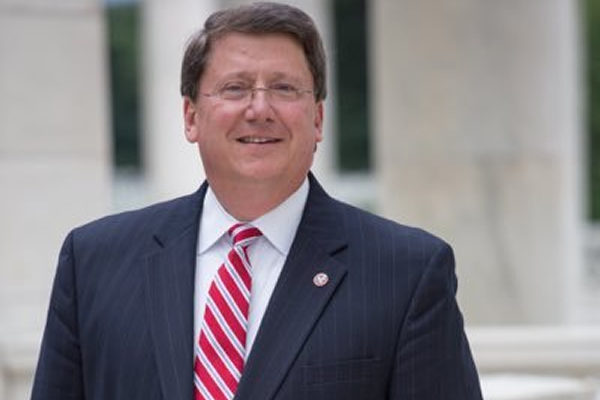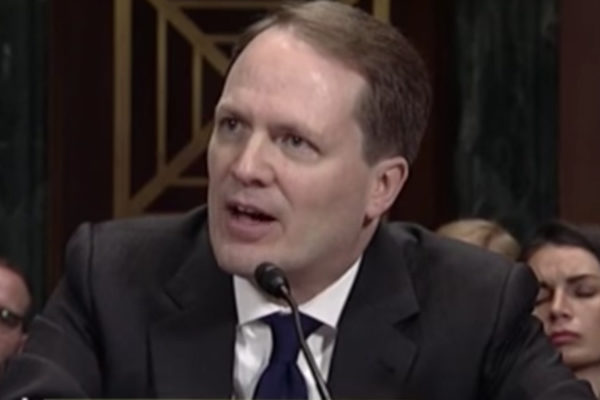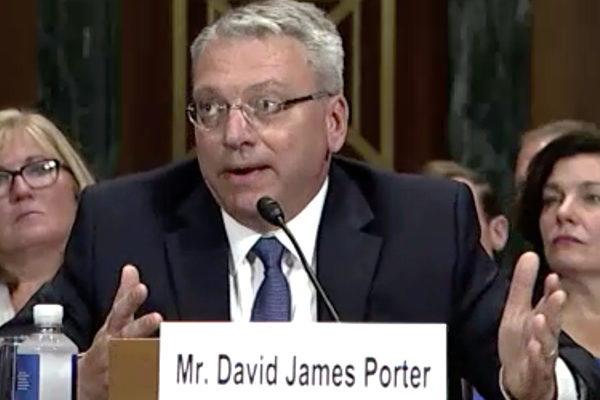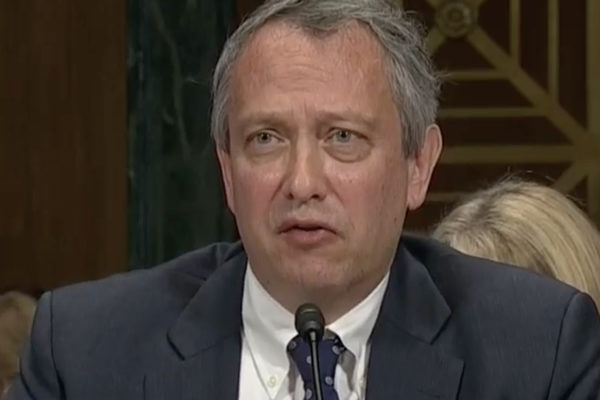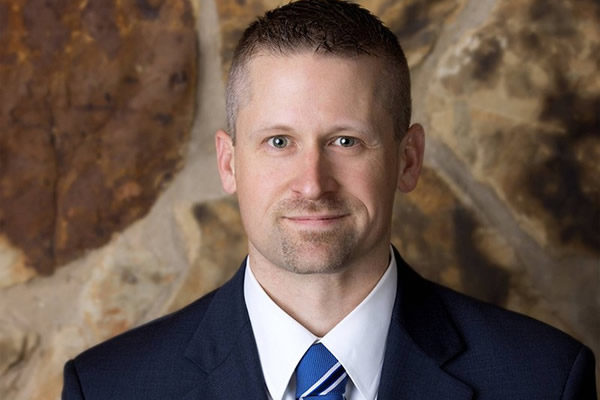McConnell Wants to Confirm These Anti-LGBT Judges

The Senate may soon confirm these Trump judicial nominees who are a threat to LGBT rights. From left, Howard Nielson, Thomas Alvin Farr, David Porter, Matthew Kacsmaryk and Mark Norris. (Screen captures of Neilsen, Farr and Porter public domain; First Liberty Institute publicity photo of Kacsmaryk; photo of Norris via Twitter)
With August fast approaching, U.S. Senators would customarily leave Washington for their annual break, but Senate Majority Leader Mitch McConnell is holding them in session for votes on President Trump’s judicial nominees — many of whom would likely threaten LGBT rights if confirmed.
The Washington Blade has highlighted five nominees that could come up for a vote and that the LGBT legal group Lambda Legal and other progressive groups have identified as hostile to LGBT rights.
Each of these nominees could receive a vote at the same time the Senate considers the nomination of Brett Kavanaugh, whom Trump has named for a seat on the U.S. Supreme Court and whom LGBT groups oppose because he came from a list of potential picks created by the anti-LGBT Heritage Foundation.
Trump named many of these picks as long as a year ago, but they have languished in the Senate as a result of opposition from civil rights groups over their records and views against LGBT rights.
Here’s background on the five nominees and their anti-LGBT records:
Mark Norris, nominated for a seat on the U.S. District Court for the Northern District of Tennessee
Nominated by Trump in July 2017, Norris has served for 17 years as a member of the Tennessee Senate, where he has supported anti-LGBT legislation and shepherded it through as Senate majority leader.
Among the anti-LGBT bills Norris supported and are now law are measures prohibiting Tennessee municipalities from enacting pro-LGBT ordinances and enabling mental health counselors to refuse to treat LGBT patients out of religious objections.
Norris as majority leader also last year moved through legislation now pending before the House that would bar the government from taking “discriminatory action” against a business based on its internal policies. The measure would bar cities from refusing to contract with companies that have no policies against anti-LGBT discrimination.
After the U.S. Supreme Court ruled in 2015 in favor of same-sex marriage nationwide, Norris challenged the legitimacy of the decision.
In September 2016, Norris was among 53 Republican legislators who filed a motion to intervene in a custody dispute case between two lesbian parents. The lawmakers argued the lesbian parent who wasn’t the birth mother didn’t have rights to her child because the Obergefell decision didn’t apply to family law.
In the final year of the Obama administration, Norris was a critic of guidance requiring schools to allow transgender students to use the bathroom consistent with their gender identity, pledging in a statement to “make sure that nothing will be done to give this ‘guidance’ any effect.” Trump has since repealed the guidance.
But Norris’ record isn’t just marked by anti-LGBT views. The lawmaker has pushed forward other initiatives criticized by civil rights groups. Among those measures are anti-Muslim legislation, English-only driver’s education, measures restricting abortion rights, legislation enhancing criminal penalties on undocumented immigrants and a voter ID law seen to block minorities from accessing the polls.
Howard Nielson, nominated for a seat on the U.S. District Court for the District of Utah
Howard Nielson made defense of California’s Proposition 8 in court — and the argument that U.S. Chief Judge Vaughn Walker’s ruling against the measure should be invalidated because the judge didn’t disclose he’s gay — a distinctive part of his legal career.
Nominated by Trump in September 2017, Nielson is a partner at the D.C.-based Cooper & Kirk, PLLC and represented the defendants in Hollingsworth v. Perry, who sought to uphold the measure banning same-sex marriage in California they placed on the ballot in 2008. The U.S. Supreme Court ultimately rejected their claims on the basis they didn’t have standing in court, restoring marriage equality to California.
But before that ruling, Nielson filed a motion seeking to vacate Walker’s ruling against Proposition 8 on the basis that he was in same-sex relationship and didn’t disclose that as he adjudicated the case.
“Chief Judge Walker thus had a duty to disclose not only the facts concerning his relationship, but also his marriage intentions, for the parties (and the public) were entitled to know whether his waivable conflict was actually a non-waivable conflict mandating his disqualification,” Nielson wrote.
Nielson’s attempt to invalidate Walker’s ruling was rejected by U.S. District Judge James Ware, who sided with pro-gay rights groups in maintaining Walker’s sexual orientation shouldn’t invalidate his decision.
In his argument in favor of Proposition 8 on its merits, Nielson suggested being gay is a choice by pointing out there is debate about how sexual orientation is defined and disputed the effect of discrimination on gay people, including increased rates of depression and suicide.
Nielson has also faced criticism for being part of the screening committee at the U.S. Justice Department during the Bush administration, which was found to have taken political affiliation into account for hiring practices. He also worked at the Office of Legal Counsel, which justified the use of torture. Nielson has also been an attorney for the National Rifle Association.
David Porter, nominated for a seat on the U.S. Third Circuit Court of Appeals
Nominated by Trump in 2018, Porter could be one of the first nominees McConnell brings up for a vote because circuit court nominees will likely be a high priority.
Porter — a partner at the Pittsburgh-based Buchanan Ingersoll & Rooney — has an anti-LGBT record that has raised concerns as a result of his association with groups and politicians who’ve expressed anti-LGBT views.
Porter leads the Lawyers Chapter of the Pittsburgh Federalist Society, a conservative legal group that argues for strict interpretation of the U.S. Constitution. In 2009, Porter co-founded the Pennsylvania Judicial Network, a group that opposed the confirmation of now U.S. Associate Justice Sonia Sotomayor, with former U.S. Sen. Rick Santorum, who has expressed notoriously anti-LGBT views.
Also of concern to LGBT groups is Porter’s opposition to the Affordable Care Act. In a 2012 article, Porter argued if the U.S. Supreme Court were to uphold Obamacare under the Commerce Clause, it would “break the Framers’ structural design.”
The process by which the Senate has advanced Porter has also raised concern. The Third Seat was open during the Obama administration, but wasn’t filled because the Senate didn’t take action after Sen. Pat Toomey (R-Pa.) refused to turn in his “blue slip” for the nominee Obama selected. The Senate has traditionally used the “blue slip” process to give deference to home state senators in the judicial nomination process.
Now, during the Trump administration, the other senator from Pennsylvania, Bob Casey (D), has refused to hand in his “blue slip” for Porter. Instead of his respecting Casey’s wishes to hold on the nominees as was done with Toomey, Senate Judiciary Committee Chair Charles Grassley (R-Iowa) has proceeded with the Porter nomination and gave him a hearing. The committee reported Porter out favorably to the Senate floor, where he awaits a confirmation vote.
Thomas Alvin Farr, nominated for a seat on the U.S. District Court for the Eastern District of North Carolina
Farr has faced criticism from LGBT groups because of the larger progressive coalition’s concern over his defense of policies seen to target minority groups, such as a North Carolina gerrymandering law seen to block black voters from being heard in the political process.
A shareholder in the Raleigh office of Ogletree, Deakins, Nash, Smoak & Stewart PC, Farr unsuccessfully represented the Republican-led North Carolina Legislature in defense of the state’s redistricting after the 2010 Census. The U.S. Fourth Circuit Court of Appeals concluded the state engaged in gerrymandering and sought to “target African-Americans with almost surgical precision.”
Farr defended a company when a supervisor said that “women with children should be at home and not employed in the workplace.” In 1998, he defended Avis against charges it was refusing to rent cars to black customers under the same conditions afforded to white customers. A staff attorney at the National Right to Work Legal Defense Foundation, Farr has also sought to undermine unionization efforts.
As legal counsel for the 1990 campaign of the late Sen. Jesse Helms, Farr faced scrutiny over efforts to intimidate black voters by distributing flyers in their neighborhoods falsely telling them they could be prosecuted for voting. Farr denied being part of the effort, but a Justice Department attorney familiar with the effort insisted he was involved.
The seat to which Farr was nominated has been open since 2005 — making it the oldest judicial vacancy in the country — and represents a 30 percent African-American district.
Former President Obama nominated for the seat former North Carolina Supreme Court Justice Patricia Timmons-Goodson, who’s black, but U.S. Sen. Richard Burr (R-N.C.) blocked the nomination as part of the “blue slip” process. Farr, who’s white, was initially nominated by former President George W. Bush and Trump renominated him in July 2017.
Matthew Kacsmaryk, nominated for a seat on the U.S. District Court in the Northern District of Texas
Nominated by Trump in September 2017, Kacsmaryk has rejected LGBT rights as deputy general counsel to the First Liberty Institute, which advocates for enabling anti-LGBT discrimination in the name of “religious freedom.”
Kacsmaryk has defined the LGBT rights struggle as a “clash of absolutes” between “religious liberty and sexual liberty,” opposing advancements in LGBT rights on many fronts at the federal and state level.
In response to the U.S. Supreme Court decision in favor of same-sex marriage nationwide, Kacsmaryk said the ruling found an “unwritten” right under the Fourteenth Amendment that was “a secret knowledge so cleverly concealed in the nineteenth century amendment that it took almost 150 years to find.”
When Rowan County Clerk Kim Davis refused to grant marriage licenses to same-sex couples, Kacsmaryk defended her, comparing her actions to that of “pacifistic Quakers” who refused fight in war and“Jewish butchers” who follow kosher dietary laws.
After the U.S. Equal Employment Opportunity Commission ruled in 2015 the prohibition on sex discrimination applies to cases of anti-gay discrimination, Kacsmaryk told The World, an outlet that reports on religious freedom, the decision was the latest in efforts to undermine marriage law.
“Traditionally and legally, we define sex according to chromosomes…That’s typically how we define sex,” Kacsmaryk said. “That’s how we ordered our marriage laws and made certain presumptions of paternity in the family code. All of that is cast into disarray if you declare sex irrelevant to marriage.”
When the Obama administration issued a rule interpreting the prohibition of sex discrimination under the Affordable Care Act to apply to transgender people, Kacsmaryk opposed the regulation and called it “radical self-definition and sex-actualization.”
Kacsmaryk also endorsed the sweeping Mississippi “religious freedom” law known as HB 1523, which enables businesses and individuals to refuse service to LGBT people and medical practitioners to deny transition-related care to transgender patients.
Editor’s Note: The Blade relied on research from Alliance for Justice as well as other sources for the basis of this reporting.
